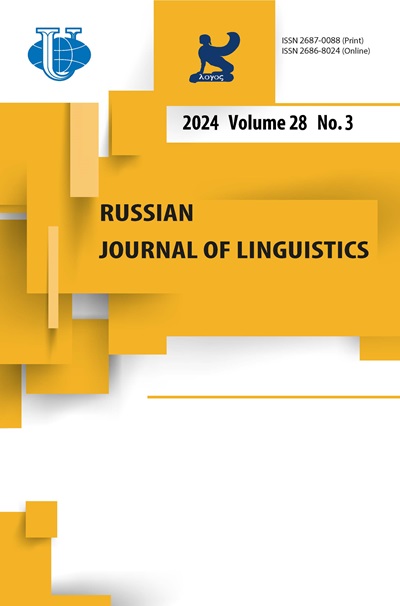The cases of observance and violation of politeness maxims by communicants in the ego-state of natural Child
- Authors: Gizatova G.F1
-
Affiliations:
- Ufa Law Institute of the Ministry of Internal Affairs of the Russian Federation
- Issue: No 4 (2014)
- Pages: 132-139
- Section: Articles
- URL: https://journals.rudn.ru/linguistics/article/view/9388
Cite item
Full Text
Abstract
Nowadays, the study of human communication is of great importance in linguistics and psychology. In order to achieve smooth and conflict-free interaction it is necessary not only to respect the rules of politeness, but also to take into account the position of the speaker and the addressee. This explains the need to study many psychological factors in communication. This paper studies the ego-state of Natural Child in speech communication. Investigating the behavior of communicants in the ego-state of Natural Child, we rely on the theory of transactional analysis (E. Bern 1961) . According to this theory, the behavior of the speaker and the addressee in the ego-states of Natural Child varies from curious, inspiring, dreamy, and natural to the selfish, spiteful, shameless and impatient. The material for investigation is the dialogs from British and American fiction of XIX-XXI centuries. The dialogs contain the speaker and addressee’s replicas, meeting the essential requirements of the Principle of Politeness (G. Leech 1983) and the theory of transactional analysis. In our work we have applied hypothetical-deductive method, and methods of definitional and contextual analysis. The anylisis of our material demonstrates that communicants in the ego-state of Natural Child observe the maxims of generosity, tact and agreement, and violate the maxims of approbation, modesty and tact. Thus, the implementation of politeness maxims by communicants in ego-state of Natural Child depends entirely on their behavior.
About the authors
Gulnara F Gizatova
Ufa Law Institute of the Ministry of Internal Affairs of the Russian Federation
Email: gulik_88@mail.ru
Departmant of Foreign and Russian languages
References
- Берн Э. Игры, в которые играют люди. Психология человеческих взаимоотношений: Люди, которые играют в игры. Психология человеческой судьбы: Пер. с англ. / Общ. ред. М.С. Мацковского. М.: Прогресс, 1988.
- Газизов Р.А. Способы реализации лингвистической вежливости в немецкой и русской культурах // Вестник Башкирского университета. 2009. Т. 14. № 1. С. 136-139.
- Горянина В.А. Психология общения. М.: Академия, 2007.
- Гулдинг М.М., Гулдинг Р.Л. Психотерапия нового решения. Теория и практика: Пер. с англ. В.М. Сариной. М.: Класс, 2001.
- Ларина Т.В., Козырева М.М., Горностаева А.А. О грубости и коммуникативной этике в межкультурном аспекте: постановка проблемы // Вестник РУДН. Серия Лингвистика. 2012. № 2. С. 126-133.
- Стюарт Я. Современный транзактный анализ / Я. Стюарт, В. Джойнс: Пер. с англ. Д. Касьянов. СПб.: Социально-психологический центр, 1996.
- Яхонтова Е.С. Психология деловых отношений: Учебно-практическое пособие / Московский государственный университет экономики, статистики и информатики. Изд. 3. М., 2003.
- Brown P., Levinson S.C. Politeness: Some universals in language usage. Cambridge: Cambridge University Press, 1987.
- Gilbert E. Committed A Skeptic Makes Peace with Marriage. URL: http://www.onread.com/ fbreader/1414239.
- Leech G.N. Principles of Pragmatics. London; New York: Longman, 1983.
- Maugham W.S. Of Human Bondage. М.: Менеджер, 2005.
- Maugham W.S. Theatre. М.: Менеджер, 1987.
- Maugham W.S. The moon and Sixpence. СПб.: Корона принт, 2005.

















